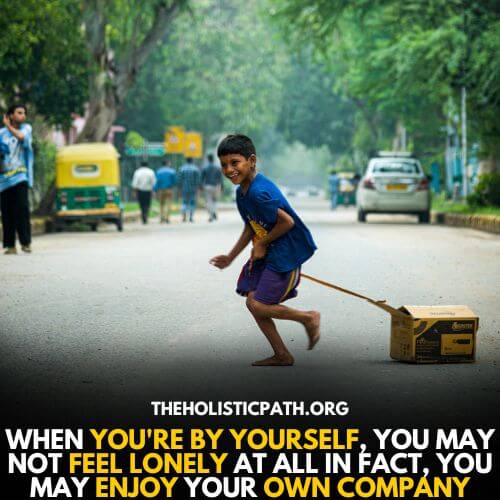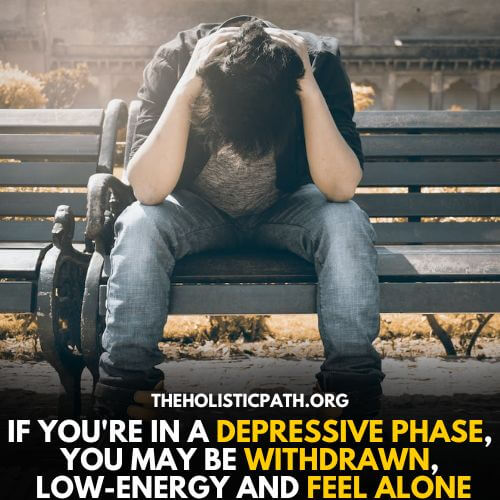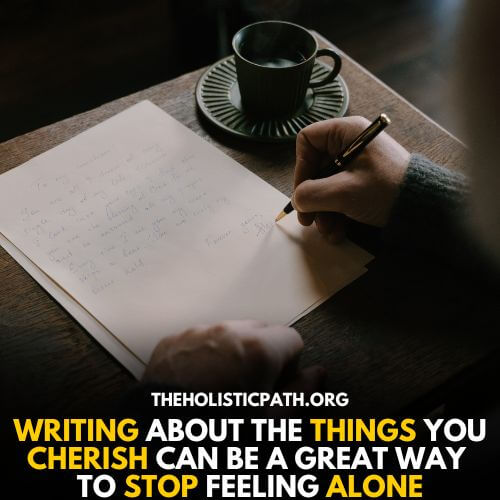If you’re feeling lonely, you’re not alone. Millions of people around the world feel isolated and disconnected from others on a regular basis. Thankfully, there are things you can do to stop feeling alone. From reaching out to others to finding ways to connect with yourself, here are some tips for combating loneliness. So if you’re feeling lonely, remember that you’re not alone in feeling that way – and there are steps you can take to start feeling better.
Why Do We Feel Alone
Being alone and feeling alone are two different things. When you’re by yourself, you may not feel lonely at all. In fact, you may enjoy your own company. But feeling alone is a different experience. It’s usually characterized by a sense of isolation, even when you’re surrounded by people.

You may feel like nobody understands you or like nobody cares about you. Feeling alone can be triggered by a number of different factors, including relationship problems, social anxiety, and depression. It’s important to remember that loneliness is a normal emotion and that there are ways to cope with it.
Here are a few causes/ reasons for you feel alone:
- Feeling misunderstood by those around you.
- Feeling like you don’t belong anywhere.
- Having few or no friends.
- Feeling like you can’t share your feelings with anyone.
- Having a difficult time making friends.
- Moving to a new city or school.
- Losing a loved one.
- Experiencing a traumatic event.
- Suffering from a mental illness or disorder.
8 Mental Illnesses And Disorders That Can Cause You To Feel Lonely
Mental illnesses and disorders can make you feel incredibly alone. It can be difficult to cope with your condition when you feel like you’re the only one going through it. These are some of the mental illnesses and disorders that can lead to the feeling of loneliness:
1. Schizophrenia
Schizophrenia can be a very isolating illness. The symptoms can make it hard to relate to other people and can cause you to withdraw from social activities. You may feel like other people are against you or that they are spying on you.
You may also hear voices or see things that no one else can see. These symptoms can make it hard to keep a job or go to school. As a result, you may find yourself feeling alone and cut off from the rest of the world.
2. Depression
When you’re depressed, it can feel like you’re all alone in the world, even if you’re surrounded by people who care about you. One of the most common symptoms of depression is social withdrawal. You may not feel like spending time with friends or family, participating in activities you used to enjoy, or even leaving the house.
This can make it hard to maintain relationships and may lead to feelings of isolation and loneliness. Depression can also cause physical symptoms that make it difficult to interact with others, such as fatigue and pain. And when you’re not feeling well, it’s tough to be your usual self. All of these factors can contribute to a sense of isolation and loneliness.
3. Anxiety Disorders
Anxiety disorders are common, affecting millions of people worldwide. They can cause a range of symptoms, including feelings of worry, dread, and fear. In severe cases, anxiety can lead to panic attacks and loneliness. This is because when you’re dealing with anxiety, your brain is in overdrive. You’re constantly on edge, worrying about what could happen next.
This can make it difficult to relax and enjoy life. It can also be hard to connect with other people when you’re feeling this way. You might avoid social situations or activities that make you anxious. As a result, you can start to feel isolated from the world around you.
4. Bipolar Disorder
When you have bipolar disorder, you may feel alone even when you’re surrounded by people. That’s because the symptoms of bipolar can make it hard to relate to other people. For example, if you’re in a manic phase, you may be talking a lot and feeling really high-energy. This can be overwhelming for people around you, and they may start to avoid you.
Or, if you’re in a depressive phase, you may be withdrawn and low-energy. This can make it hard to keep up with friends or family. Either way, your symptoms can make it feel like nobody really understands what you’re going through.

5. Post-Traumatic Stress Disorder
Post-traumatic stress disorder (PTSD) can cause you to feel alone for a number of reasons. First and foremost, PTSD can lead to social isolation. When you’re dealing with PTSD, it’s common to feel like you can’t trust anyone or that no one understands what you’re going through. This can lead you to withdraw from friends and family. Additionally, PTSD can cause you to avoid certain places or activities that remind you of the trauma you experienced.
For example, if you were in a car accident, you might avoid driving or getting in a car. This avoidance can further increase your feelings of isolation. Lastly, PTSD can cause changes in your thinking and mood which can make it difficult to connect with others. For example, you might have negative thoughts about yourself or feel constantly on edge. These changes can make it hard to participate in normal social activities.
6. Obsessive Compulsive Disorder
It’s tough living with obsessive-compulsive disorder. You’re constantly bombarded with intrusive, unwanted thoughts and feelings that make you feel uncomfortable, anxious, and even scared. This can make it hard to focus on anything else or enjoy your life.
OCD can also cause you to feel isolated and alone. You may worry that people will think you’re weird or crazy if they find out about your obsessions and compulsions. This can make it hard to socialize and connect with others.
7. Eating Disorders
Eating disorders can cause people to feel isolated and alone for a number of reasons. First, the illness itself can make it difficult to maintain relationships. For example, someone with anorexia may become withdrawn and refuse to socialize.
Additionally, eating disorders can take a toll on a person’s physical appearance, which can lead to feelings of insecurity and low self-esteem. Furthermore, the negative thoughts and behaviors associated with eating disorders can put a strain on even the closest of bonds.
8. Borderline Personality Disorder
BPD can make it difficult to trust others and to feel like you belong. Symptoms of BPD include:
- Intense fear of abandonment
- Unstable relationships
- Chronic feelings of emptiness or boredom
- Explosive anger
- Self-harm or suicidal thoughts
These symptoms can make it hard to maintain close relationships. And when relationships do begin to crumble, the resulting feelings of rejection and isolation can be overwhelming. If you have BPD, you might feel like you’re never really part of a group or community. It can be hard to find people who understand what you’re going through and who can provide support.
25 Things To Do To Stop Feeling Alone
Feeling alone is a common experience, but it doesn’t have to be permanent. Here are 25 tips to help you feel less alone and more connected:
1. Acknowledge That You Are Feeling Lonely
Many people pretend they’re okay when they’re feeling lonely, but this only makes the feeling worse. Acknowledging that you’re feeling lonely can help you in a few different ways. First, it can stop you from feeling alone. Just the act of admitting that you’re lonely can make you feel less alone.

Second, it can help you to find ways to connect with other people. When you’re honest about your loneliness, you can start to reach out to other people and build connections. Lastly, acknowledgment can lead to change. If you’re not happy with being lonely, admitting it is the first step towards finding ways to change the situation.
2. Avoid Self-Pity: It’s Not Just You
When we’re feeling down, it’s easy to fall into the trap of self-pity. We start to believe that we’re the only ones who feel this way, that nobody understands us, and that things will never get better. However, this kind of thinking only leads to more loneliness and isolation.
Instead of wallowing in self-pity, try to remember that everyone feels alone at times. Even people who seem to have it all together sometimes feel like they’re just going through the motions.
3. Be Realistic In Your Desires
People are social creatures. We crave connection and belonging. That’s why feelings of loneliness can be so tough to deal with. When we’re feeling alone, it can feel like there’s something wrong with us. Like we’re not doing something right. But the truth is, everyone feels lonely sometimes. It’s a normal and natural part of being human.
The important thing is how we deal with those feelings. One way to stop feeling so alone is to be realistic in our desires. We can’t be surrounded by people all the time, and that’s okay. We don’t always need to be in a relationship or have a ton of friends. Sometimes, all we need is one close friend or family member to confide in. Other times, we just need some time to ourselves to recharge and refocus. And that’s perfectly normal too.
4. Don’t Further Isolate Yourself
If you’re feeling isolated and alone, it can be tempting to further isolate yourself in an effort to stop feeling that way. However, this is usually counterproductive. When we’re feeling lonely, it’s important to reach out to others and connect with them.
This can help us feel less alone and provide some much-needed social interaction. Additionally, participating in activities with others can help us take our minds off of our loneliness and make us feel more connected. So if you’re feeling lonely, try not to isolate yourself further. Instead, reach out to others and participate in activities with them. It may just help you stop feeling so alone.
5. Write Down Things You Cherish
Everyone has things they cherish. It could be a past memory, a future hope, or something they love in the present. Maybe it’s a person, a place, an animal, or even just a feeling. Whatever it is, it’s something special to you. And when you cherish something, it can be tough to keep it to yourself. You want to share it with others, but sometimes you don’t know how.

Writing about the things you cherish can be a great way to stop feeling alone. When you write about your cherished things, you’re creating a connection with them. You’re also giving yourself permission to really think about and explore what they mean to you. And as you do that, you might be surprised by how much comfort and joy they bring you.
6. Smile And Laugh More Often
Smiling and laughing more often can help stop feeling alone for a number of reasons. First, it feels good to smile and laugh. When we do something that feels good, we tend to want to do it more. Additionally, smiling and laughter are contagious.
When we see someone else smiling or laughing, it triggers the same response in us. So, by smiling and laughing more often, we can create an upward spiral of positivity that can help to break through the loneliness. Finally, when we smile and laugh, we release endorphins, which have mood-boosting effects.
7. Volunteer
When you volunteer, you’re actively reaching out and connecting with other people who share your interests. This can help you to find new friends and develop a stronger sense of community. And as you work together towards a common goal, you’ll likely find yourself feeling more connected and less alone. Volunteering can also help you to develop new skills and knowledge.
By working with others and learning new things, you can boost your confidence and feel more competent in your abilities. So if you’re feeling lonely, consider volunteering as a way to connect with others and make a difference in your community.
8. Nurture Relationships With People Who Make You Feel Good
When we feel alone, it can be a difficult emotion to manage. It can be tough to stop the negative spiral of thoughts. Our mental and emotional health can suffer when we don’t have supportive and nurturing relationships. Luckily, there are things we can do to stop feeling alone. One of the most helpful things is to seek out and nurture relationships with people who make us feel good.
When we’re surrounded by people who support us, love us, and make us feel valued, it’s much easier to stop feeling alone. We can also stop feeling alone by getting involved in activities and causes that are important to us. When we have a sense of purpose and belonging, it helps us to stop feeling alone. There are many ways to stop feeling alone. Nurturing relationships with people who make us feel good is one of the best ways to do it.
People who make you feel good about yourself will:
- Make you feel seen and heard;
- Accept you for who you are;
- Be there for you when you need them;
- Make you laugh; and,
- Be supportive, without being judgmental
So if you’re feeling lonely, make an effort to reach out to the people in your life who make you feel good. You’ll be glad you did.
9. Adopt A Pet
Pets can provide us with companionship, which is especially beneficial if we’re feeling lonely. When we interact with our pets, it can help to stop us from feeling isolated and alone. We can also learn to care for another living creature, which can give us a sense of purpose.
In addition, spending time with pets can help to reduce stress and anxiety levels. Pets can provide us with an outlet for physical affection, and they can also help to boost our moods.
10. Enroll In A Class
Stop feeling alone, and enroll yourself in a class. You’ll be around other people who are interested in the same thing that you are, and you’ll have the opportunity to interact with them on a regular basis. Additionally, classes give you a sense of structure and purpose.
They can provide you with a much-needed break from your everyday routine, and they can help you to meet new people and make new friends. If you’re interested in a particular subject, enrolling in a class is a great way to meet other people who feel the same way. You might even make some friends that way.
11. Carve Out A Plan For Yourself
When you stop and think about it, feeling alone is often just a matter of perspective. Sure, there are times when we’re physically alone, but that doesn’t mean we have to feel emotionally isolated. One way to combat those feelings is to develop a plan for yourself. This could be something as simple as taking some time each day to focus on your mental and emotional health.
Maybe you set aside 30 minutes each day to read or take a daily walk to clear your head. Whatever it is, carving out time for yourself can help you to feel more connected and less alone. Of course, it’s also important to reach out to others when you’re feeling isolated. Whether it’s talking to a friend or family member, or joining a supportive online community, connecting with others can go a long way in combating feelings of loneliness.
12. Stop Dreading Calls
If you’re like most people, you probably dread having to make phone calls. Whether it’s calling customer service or checking in with a friend, it can be tough to muster up the courage to pick up the phone. But what if I told you that making phone calls could actually help you stop feeling alone?
Here’s how it works: when we make phone calls, we force ourselves to interact with another person. Even if we don’t say much, just hearing another person’s voice can be comforting. And the more we reach out to others, the less alone we’ll feel.
Here are a few tips:
- First, recognize that most people are just as nervous about making calls as you are. They’re not judging you, they’re just hoping the call will be over soon.
- Second, remember that the person on the other end of the line is a human being just like you. They have fears and worries and joys, and they’re probably looking for a friend just as much as you are.
- Finally, relax and be yourself. The worst that can happen is that you’ll have to end the call early. But chances are, you’ll find that the person on the other end of the line is happy to chat. And who knows? Maybe you’ll even make a new friend.
13. Go Out In Nature More Often
Being in nature has a way of making us feel small. When we see the vastness of a mountain or the ocean, it can put our problems into perspective. We realize that we are just a tiny part of something much bigger and that our problems are not as big as we thought.

Being in nature can also help us to connect with other people. We can share our love of hiking or bird watching, and we can bond over our shared experiences. In short, spending time in nature can help us to stop feeling alone.
14. Get Out Of Your Comfort Zone: Take Social Risk
Being around other people is a great way to stop feeling alone. But sometimes it’s hard to take the first step and put yourself out there. That’s where getting out of your comfort zone comes in. Stepping outside your comfort zone means doing things that make you feel a little bit uncomfortable. But it’s worth it because taking social risks can help you to stop feeling alone.
Here are a few ideas for ways to get out of your comfort zone:
- Talk to someone new every day. This could be a co-worker, a classmate, or someone you meet in line at the grocery store.
- Join a club or group that meets regularly. Whether it’s a book club, a hiking group, or an intramural sports team, being part of a group can help you to stop feeling alone.
- Plan outings with friends, even if you’re not sure you’ll have fun. Sometimes the best way to stop feeling lonely is to just fake it ’til you make it. Chances are, you’ll have more fun than you expect once you’re actually out and about.
Taking social risks may not be easy, but it’s definitely worth it. It’s the best way to stop feeling alone and start making new friends. So go out there and give it a shot!
15. Loneliness To Solitude
When you’re alone, you can choose to either feel lonely or not. But if you stop and think about it, loneliness is kind of like a drug addiction. The more you Invite it into your life, the more you get used to it, and the more you need it. That’s why it’s important to learn how to loneliness into solitude. That way, even when you’re alone, you don’t have to feel lonely. Here’s how:
- Make sure your alone time is quality time. Do things that make you feel good, that make you feel productive and accomplished.
- Find ways to connect with other people, even when you’re by yourself. listening to music, reading books, or watching TV are all great ways to do this.
- Keep yourself busy. The less time you have to sit around and think about how alone you are, the better off you’ll be.
- Make sure your alone time is voluntary. If you’re only spending time by yourself because you have no other choice, then it’s going to be harder to enjoy it.
- Embrace your alone time. Learn to appreciate the peace and quiet, and the chance to focus on your own thoughts and feelings without distractions.
By following these tips, you can stop feeling lonely even when you’re by yourself. So next time you find yourself alone, remember that it’s an opportunity to practice solitude instead.
16. Take A Pause From Your Busy Lifestyle
We all know how hectic life can be. We’re constantly running from one place to the next, trying to get everything done. And in the midst of all this craziness, it’s easy to feel alone. But taking even just a few minutes out of your busy schedule to pause and reflect can help you to reconnect with yourself and stop feeling alone.
When you take a break, even if it’s just for a few minutes, you can step back and evaluate what’s going on in your life. You can take stock of what’s important to you and what you’re doing that might be causing you to feel disconnected from yourself. Once you identify the source of your loneliness, you can begin to address it.
Whether it means spending more time with loved ones, taking up a new hobby, or simply carving out some time each day for yourself, making a conscious effort to stop feeling alone can make a world of difference.
17. Talk About How You’re Feeling With A Therapist Or Counselor
If you’ve been feeling low, it can be tough to reach out and talk to someone about it. It’s easy to feel like you’re the only one going through a tough time. But the truth is, we all go through difficult times in our lives. Talking to a therapist or counselor can help you to stop feeling alone. Here’s how:
- When you talk about your feelings, you’re giving them a voice. This can help them to feel more real, and less like something you’re just imagining.
- You’re also sharing your experiences with someone who isn’t judging you. They’re there to listen and offer support, not to tell you what you should or shouldn’t be feeling.
- Talking about your feelings can help you to understand them better. Once you know why you’re feeling a certain way, it can be easier to deal with those feelings.
- Finally, talking to a therapist or counselor can help you to develop new coping strategies for dealing with difficult emotions.
So if you’ve been feeling down, don’t hesitate to reach out for help. Talking to someone could be the first step towards feeling better.
18. Stay Mindful Of The Positive Aspects Of Your Life
It can be easy to focus on the negative, but by taking a step back and reminding yourself of the good things in your life, you can help to increase your overall happiness and sense of well-being. Keeping a positive outlook can also make it easier to deal with challenging situations when they arise. And, when you feel good about yourself, you’re more likely to attract positive relationships into your life.
19. Get Organized And Do Things That Make You Feel Accomplished
When you’re feeling alone, one of the best things you can do is get organized and start ticking items off your to-do list. There’s nothing quite like the sense of accomplishment that comes with completing a task, no matter how small. And as you start to feel more productive, you’ll also start to feel less alone. Suddenly, your days will feel more purposeful and meaningful.
Of course, getting organized isn’t always easy. But there are plenty of resources out there to help you get started. Why not check out some of the following:
- A planning app or tools like Evernote or Trello
- A bullet journal or day planner
- A list of things you want to accomplish in the next week, month, or year
Once you have a plan in place, it’s time to start taking action. Set yourself some achievable goals and start working towards them. As you start to see progress, you’ll be amazed at how much better you feel. And pretty soon, those feelings of loneliness will start to fade away.
20. Explore Your Creative Side
Being creative can sometimes feel like a very solitary activity. Whether you’re painting, writing, or just doodling, it can be easy to feel like you’re the only one in the world doing what you’re doing. But creativity is actually a great way to connect with others and stop feeling alone.
When you’re engaged in creative activities, you’re tapping into something that’s universally human. We all have the ability to be creative, even if we don’t all express it in the same way. So when you’re feeling lonely, try exploring your creative side. It may just help you to stop feeling alone.
21. Say Bye To Social Media
When you’re feeling lonely, it can be tempting to reach for your phone and scroll through social media. But what you may not realize is that this can actually make you feel even more alone. Studies have shown that spending too much time on social media can lead to feelings of isolation, jealousy, and envy.
So if you’re looking for a way to stop feeling alone, one of the best things you can do is take a break from social media. Disconnecting from social media can help you to focus on the relationships that matter most in your life, and it can also give you the opportunity to reconnect with the world around you.
22. Live For A Cause
There are many benefits to living for a cause. Perhaps the most important benefit is that it can help you to stop feeling alone. When you have a cause to fight for, you suddenly have a community of like-minded individuals who are all striving towards the same goal. You also have a sense of purpose and a reason to wake up every morning.
In addition, living for a cause can help you to develop a stronger sense of self-identity and confidence. When you know what you stand for, it becomes easier to make decisions and stick to your convictions. As a result, living for a cause can have a profound impact on your life and well-being.
23. Remember It’s Not Permanent
It’s easy to feel alone when you’re experiencing a tough emotion like sadness, anger, or anxiety. But it’s important to remember that these feelings are usually temporary. They come and go, and they don’t last forever. When you’re feeling down, remind yourself that this is not a permanent feeling. This can help you to stop feeling so alone.

Instead of wallowing in your negative emotions, focus on the positive things in your life. Think about your friends and family, your hobbies and interests, and the things that make you happy. Dwelling on the negatives will only make you feel worse, but thinking about the positives will help you to start feeling better.
24. Don’t Forget You’re In Control
We can easily forget that we’re the ones in charge of our own happiness. We often rely on others to make us feel happy, loved, and supported. But when we stop and remember that it’s up to us to create our own happiness, we can stop feeling so alone. Everyone has their own unique path to happiness, and it’s up to each of us to find what works for us. We can’t always control what happens to us, but we can control how we react to it.
If we want to stop feeling alone, we need to start by accepting ourselves for who we are. We also need to draw a line between what we’re willing to put up with and what we’re not. When we stop expecting others to make us happy, we give ourselves the power to create our own happiness. And that’s a very freeing feeling.
25. Plan Get-Togethers With Friends
Just the act of planning and looking forward to seeing your friends can help you to stop feeling alone. And when you’re finally together, you’ll be able to catch up, share stories, and enjoy each other’s company. Here are a few tips for planning a get-together with friends:
- Choose a date and time that works for everyone. If you’re struggling to find a time that works, try using a service like Doodle or PollDaddy to help schedule things.
- Pick a place that’s convenient for everyone. Whether it’s someone’s house, a park, or even just a coffee shop, make sure the location is easy for everyone to get to.
- Plan some activities. This doesn’t have to be anything fancy – just something to help break the ice and give everyone something to do. Maybe you could play some games, watch a movie, or even just chat over some snacks or drinks.
By taking the time to plan ahead, you’ll make it easier for everyone to attend and stop feeling alone in the process.
Conclusion
If you’re feeling alone, there are plenty of things you can do to stop feeling that way. First, try reaching out to your friends and family. Spend time with people who make you feel good about yourself. Secondly, get involved in activities and hobbies that interest you. This will help you meet new people and make new friends. Finally, remember that you are not alone. There are millions of people all over the world who feel just like you do. You are not alone!
